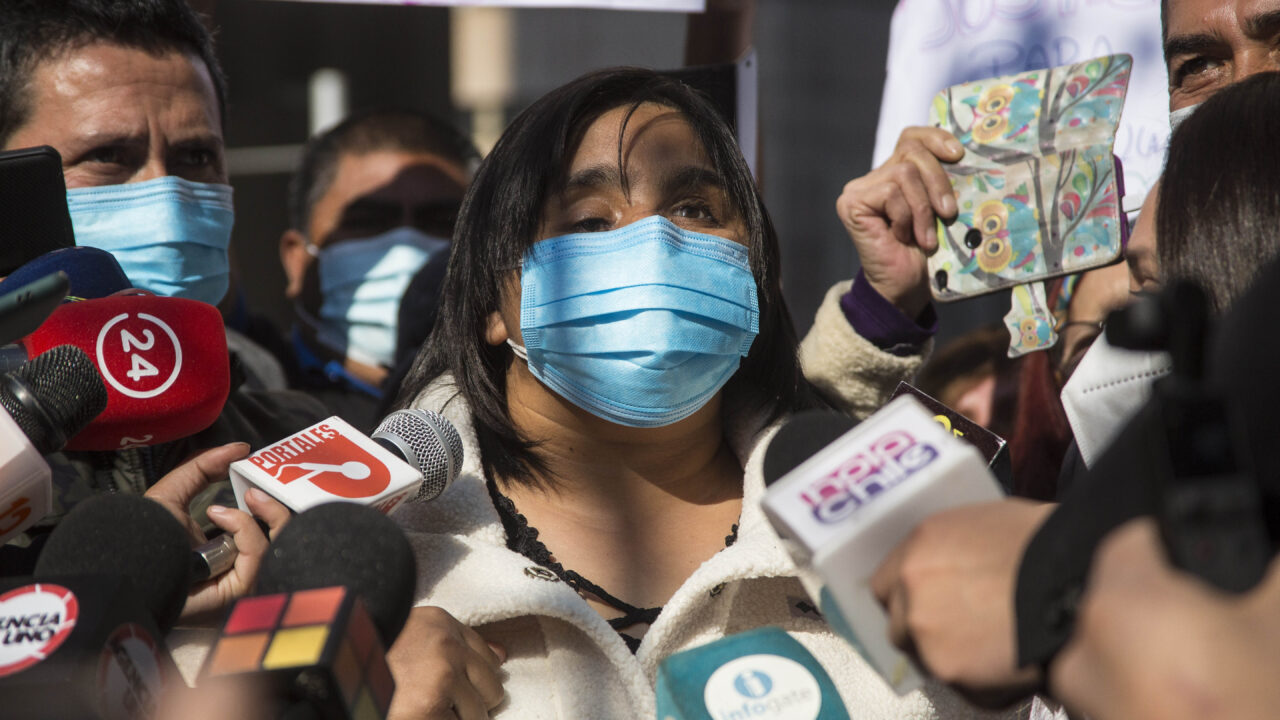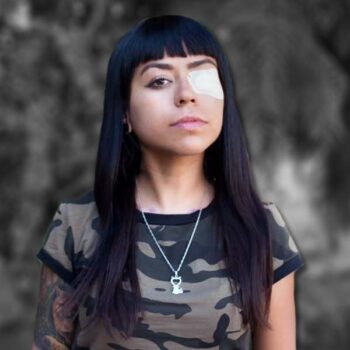I remember the first time I heard the name Fabiola Campillai Rojas. It was on television, on the night of November 26, 2019, during Chile’s social uprising. The news was reporting that a working-class woman, on her way to the factory where she worked in the commune of San Bernardo, had been shot directly in the face by the police and was now fighting for her life. The news terrified me, haunted me. It was another terrible attack on top of so many others., For those of us covering the uprising on the streets of Santiago, the situation was infuriating and devastating. Days later, the same media announced that this woman had lost both eyes, in addition to her senses of taste and smell.
During those weeks of horror, I went out on the streets again and again to make visible this great struggle for social change. As I walked with my camera and microphone, I wore a bandage stained with red ink on my head, in honor of Fabiola Campillai, Gustavo Gatica, Natalia Aravena, Daniel, Matias and hundreds of other victims of ocular trauma. At that moment, we were demanding an immediate end to the systematic violations of our human rights and justice for all those who suffered sexual abuse, who were tortured, who died, or who were seriously injured by militarized police. I couldn’t have imagined that I would become the next victim, adding to an endless list of emergencies at hospital eye trauma units.
It happened on the night of December 31, 2019, as I was heading to work as a documentary filmmaker with a group of colleagues at Plaza de la Dignidad (“Dignity Plaza,” formerly known as “Plaza Italia”), the focal point of the demonstrations in Santiago. A police squad shot straight at us at face level, and I tried to dodge it, but it was too late. I felt a sudden, inexplicable pain in my face that knocked me to the ground and then everything faded to black. That night, they took away the vision in my left eye. During my medical rehabilitation, I decided to begin a long path of fighting for justice, which brought me together with Fabiola Campillai.
One year after the attack, I visited Fabiola for the first time in her home. We hugged, and as she smiled at me, her calm demeanor and courage impressed me so much that I couldn’t help crying. It was so disturbing for me to see her face covered with the scars of state violence. We’ve been walking together ever since: I helped document her case and, later, participated in her parliamentary campaign. In November 2021, Fabiola Campillai Rojas won a historic number of votes and was elected senator with the first national majority.
To this day, I work with her in communications and on the Comprehensive Reparation Roundtable for Victims of the Social Uprising, together with the Undersecretary for Human Rights of the Ministry of Justice. Our political priorities are: the truth, the release of political prisoners, justice, comprehensive reparation, and guarantees of non-repetition — because we never want these crimes to be repeated or for a president to declare war on his people again. I talked with the Senator about her experience, what made her decide to run for office, and what her hopes are for the future.
Editor’s note: this interview, which has been edited and condensed, was recorded before the September 4th plebiscite rejecting the proposed constitution.
Where did you find the strength to move forward and become a human rights defender?
Well, one of the saddest days of my life was when I suffered this attack, but my entire family was always there, taking care of me and encouraging me. So, I understood that I had to keep going for my children, who mean the world to me. Later, once I was doing better physically, I stood up to fight for justice, and I continue to this day because I hope to get justice for myself and for all my comrades who were victims of human rights violations during the social uprising and the disastrous government of Sebastian Piñera Echeñique.
How is it that you decided to go from being a social leader in your neighborhood to a candidate for the Chilean Senate?
Honestly, at first it didn’t even cross my mind. I’ve always looked for a way to help my people get justice however I can, and I thought at some point that perhaps I could get enough support to become a city council member. But along the way, a lonko, which is an ancestral authority of the Mapuche indigenous people, proposed me as a senatorial candidate — she told me that this was also a way of doing justice. My husband and I gave it some thought, and I felt it was a great opportunity to seek justice and fight against the impunity for the thousands of human rights violations that occurred during the social uprising. So, I discussed it with my family and decided to do it. It was a simple campaign, with very few resources but with a ton of conviction and solidarity.
How have you felt being a senator in the Chilean Congress?
Obviously, it’s a huge responsibility, with everything it entails: working on laws and as part of the commissions on human rights, childhood, and adolescence. It’s very important to me, and that’s why there isn’t a single day when I’m not working. It’s difficult to imagine that I’m all alone in the Senate doing this new type of politics because I’m the only independent, but it does give me hope to know there are many people behind this, an entire people that voted for me. So, I’m going to remain in politics, because things have to change, because we have to encourage more young people (or more people in general) to dare to occupy these places of power, which have been denied to the people for many years. I seek to inspire new generations, the disabled, ordinary people like us, working people, so that they are bold enough to enter these spaces of power, because we’re the only ones who really know what the people need. Our people need representatives who come from the people.
And what do you think of the constitutional proposal?
The people were unequivocal during the social uprising: we were asking for structural changes. We had a plebiscite and, later, democratically-elected constituents in a world-renowned, plurinational process with gender parity. I’ve had them read the proposed new constitution to me, and it’s undoubtedly the best proposal we have, because it covers historical social demands that our people have raised. We must defend it, and that’s why I’m campaigning and touring for the approval of the new constitution in the exit plebiscite on September 4.
We need greater social justice, territorial equity, social rights such as better health care, decent housing, inclusion of people with disabilities, recognition of domestic and care work, more rights for women, and more opportunities for all our people — and not just for the political elite that defends the bloody constitution of Augusto Pinochet, written during a dictatorship, with the military and behind closed doors, with no participation or representation of the people.
It’s evident that Chileans want change; we want justice.

